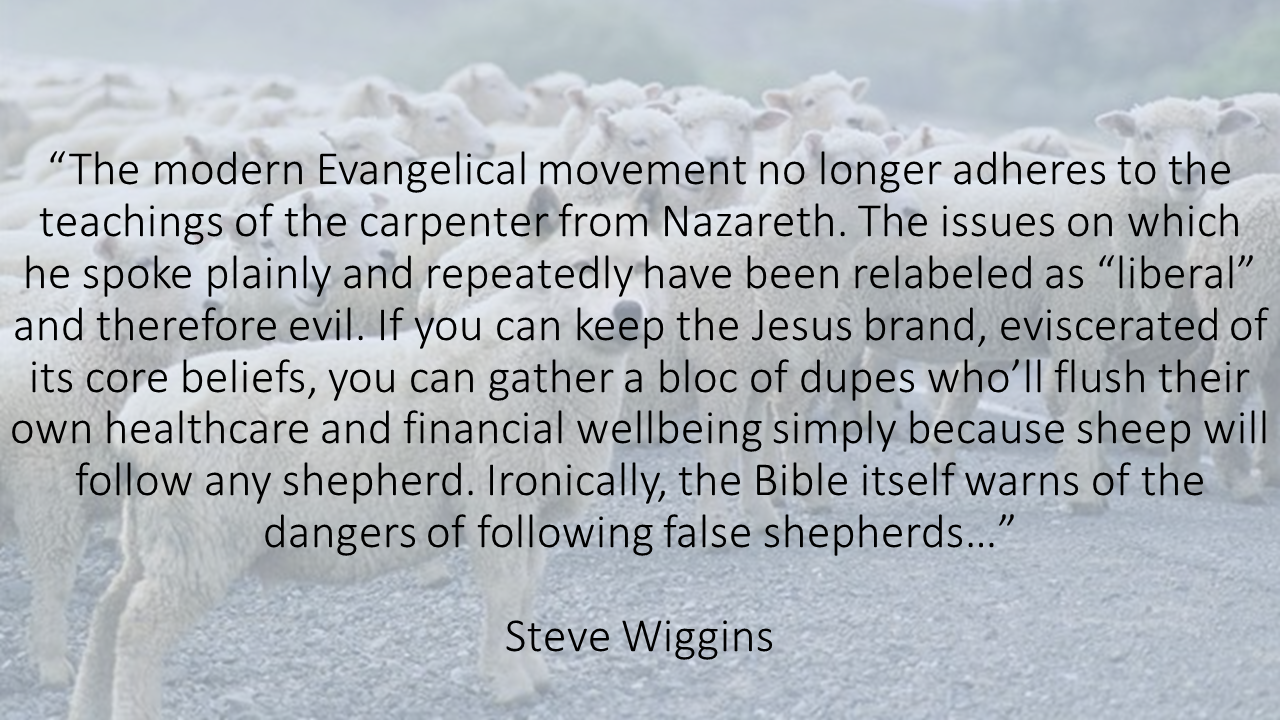
Steve Wiggins wrote in a recent blog post:
The modern Evangelical movement no longer adheres to the teachings of the carpenter from Nazareth. The issues on which he spoke plainly and repeatedly have been relabeled as “liberal” and therefore evil. If you can keep the Jesus brand, eviscerated of its core beliefs, you can gather a bloc of dupes who’ll flush their own healthcare and financial wellbeing simply because sheep will follow any shepherd. Ironically, the Bible itself warns of the dangers of following false shepherds. None of that matters anymore. And those who joined the group because of that Bible wonder now who they really are.
Click through to read the rest of the post, in which he pinpoints an irony in the fact that conservative Christians adamantly warn about the dangers of false teachers. They never seem to entertain the possibility that their favorite teachers who tickle their ears might be precisely the sorts of people the Bible warns about.
Derek Penwell also wrote about Evangelicals and apocalypticism in the present political climate, including a provocative challenge to liberals and progressives. Here is an excerpt:
Apocalypticism, a kind of eschatology concerned with the end of the world, is usually a cry for help from those who feel like they have no hope of digging themselves out of the hole they’re in (think Revelation, also known as The Apocalypse of John). Because people feel like they have no agency to change what’s wrong with the world, apocalypticism is a desperate desire for some power to come and vanquish foes and put things right. If you feel powerless to change your situation, the apocalypse sounds like relief, a vindication against adversaries you can’t defeat on your own.
The rich and powerful don’t cling to threads of an apocalyptic desire for deliverance. Because why would they? Deliverance from what? If you’re already safe, if you feel like you have some control over your situation, the apocalypse promises nothing for you but disruption and chaos—which is something to be feared, not embraced.
It’s the poor and powerless, the oppressed and afflicted who hang on to the faint strands of hope that apocalypticism promises—because they’ve exhausted confidence in their own ability to make meaningful change. Consequently, if change is to be had, it will have to come from somewhere outside themselves—from somewhere or something with the promise of strength to defeat the foes of those too beleaguered or helpless to do it themselves.
That’s why, I suspect, Donald Trump remains popular among two distinct sets of people: 1) those who long for a kind of savior, and 2) those who profit from people desperate for a savior. The first group sees people like me as the enemy, liberals and progressives who make fun of them and whom they believe (have been convinced?) are the source of their powerlessness and alienation from cultural respectability. The second group cynically plays on those resentments to rig the system that allows them to retain wealth and power. The first group deserves our empathy, the second group our contempt…
Click through to find out where he goes from there. See too the post by Hemant Mehta about a pastor who said that Evangelicals who don’t support Trump simply don’t take the Bible seriously!













